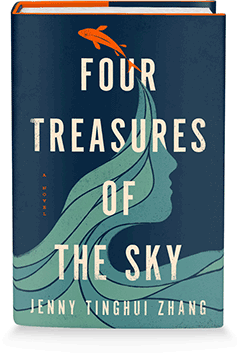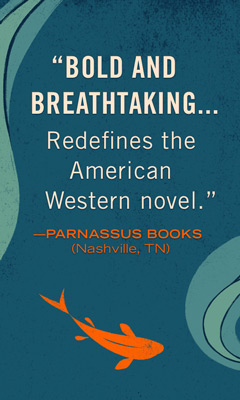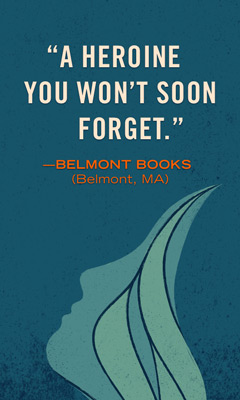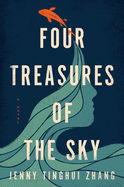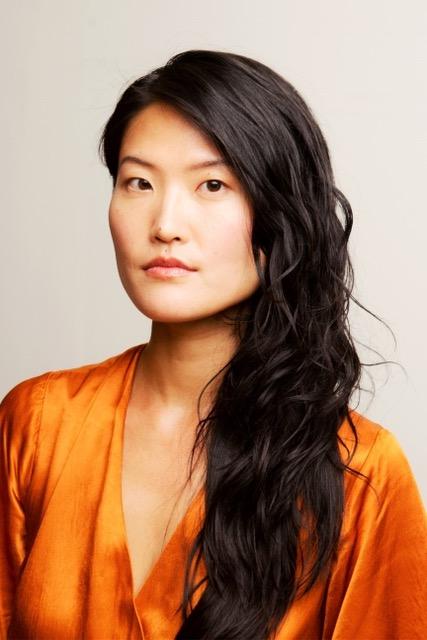Four Treasures of the Sky
by Jenny Tinghui Zhang
Jenny Tinghui Zhang's breathtaking debut novel, Four Treasures of the Sky, opens like a traditional hero's journey, something that might need multiple sequels to encompass the breadth and ambition of its saga. But the story is pared down to its essence and thus reads more like poetry, subtle but effective, taut without sacrificing immersion. This continent-hopping coming-of-age story set in the late 1800s follows young Daiyu, named after the fictional poet Lin Daiyu of Chinese literature. Our protagonist despises this name for the curse she feels it puts upon her: a life doomed to sadness and frailty. At home in China, in the comfort and familiarity of her fishing village, Daiyu vows she will shed the melancholy of Lin Daiyu's legacy.
When her parents disappear one night for reasons Daiyu can't understand--she later learns they were arrested--she's shipped away to Zhifu by her grandmother for her own safety. Far from her beloved village and desperate for any kind of work, Daiyu clings to the gift her family gave her: she is skilled with her hands. In Zhifu, she assumes the name and appearance of a boy named Feng, who sweeps the stones outside a school and learns traditional Chinese calligraphy under the imaginative, dreamlike tutelage of a man known only as Master Wang. But the dream cannot last, as readers know from the very first paragraph: "When I am kidnapped, it does not happen in an alleyway. It does not happen in the middle of the night. It does not happen when I am alone."
After following a mysterious but magnetic man in pursuit of a noodle shop, Daiyu suddenly awakes in darkness. In that darkness, she's taught English by an unknown woman, and gradually Daiyu understands that Zhifu is gone, China itself is gone, her very self is to be banished. She is going to America, though for what purpose she doesn't initially grasp. Soon, though, the truth becomes obvious: she might bear the name of a boy, but she has the body of a girl, and she'll be expected to use it.
In a San Francisco brothel run under the guise of a laundromat, her name transforms again, as does her identity. Daiyu turns into Peony, and she loses something of herself in the process. But even in the sickening monotony of her daily work, and in the trauma that suffocates the girls around her, Daiyu clings to the hope she first manifested in Zhifu. Somehow, there will be escape. There will be beauty. Only when she meets a Chinese boy named Samuel does the promise of a real life appear before her, and with it a trip deeper into the American West, into a world she has no concept of: Idaho, a land without an ocean. Her name shapeshifts yet again. "Daiyu to Feng to Peony to Jacob Li," Daiyu narrates. "When will I be me again? And if I become me again, will I know who she is?"
As the Chinese Exclusion Act warps America--during the era of this book and deep into our present reality--Daiyu is forced to protect herself by burrowing further into the identity and physicality of Jacob Li. She loses her body but retains the spirit she first unfurled in Zhifu. She knows how to survive, even how to capture the beauty around her, so long as she believes home is her final destination.
It is this hope in the face of crushing tragedy that makes Four Treasures of the Sky such a triumph. Unlike the character she is named for, Daiyu is not melancholic, though her life is defined by atrocities that should prompt such sadness. She is introspective and damaged, yes, but a spark remains in the pit of her chest, a sacred thing both childlike in its innocence and mature in its power.
Zhang has admitted that she fretted over being able to capture the voice of a 13-year-old girl, yet there was never any reason for such worry. As a narrator, Daiyu speaks with remarkable clarity, an intelligence that never undermines or counteracts her youth. This intelligence is perhaps best exemplified when she recognizes the stares of the white Americans around her: "My body is covered in the syllables of another language, the scroll of a kingdom that has existed long before they did and will continue existing long after they are gone. I am something they cannot fathom. I am something they fear. We all are."
Throughout the book, Lin Daiyu serves as a sort of ghost, hovering beside Daiyu and occasionally speaking to her--sometimes taunting, sometimes guiding. The result is a story that combines the tragic with the beatific, the historic with the folkloric. Zhang blurs these lines with such grace that the book reads easily, in spite of its heavy material. But it is the final few paragraphs that will stick between the ribs of any devoted reader. Zhang has accomplished a remarkable work of fiction that feels so real it stings. --Lauren Puckett



